Garden Maintenance in Islington
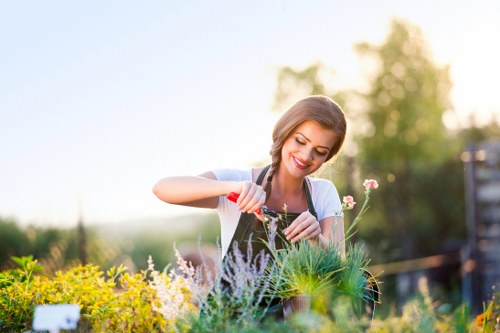
The Importance of Regular Garden Maintenance
Maintaining a garden in **Islington** not only enhances the aesthetic appeal of your property but also promotes a healthy environment. Regular maintenance ensures that your plants thrive and that your outdoor space remains inviting throughout the year.
Consistent garden care can prevent common issues such as pests, diseases, and invasive weeds. By staying on top of garden tasks, you can save time and resources in the long run, ensuring that your garden remains a beautiful retreat.
Moreover, a well-maintained garden contributes to the overall wellbeing of the community in Islington, providing green spaces for relaxation and social gatherings.
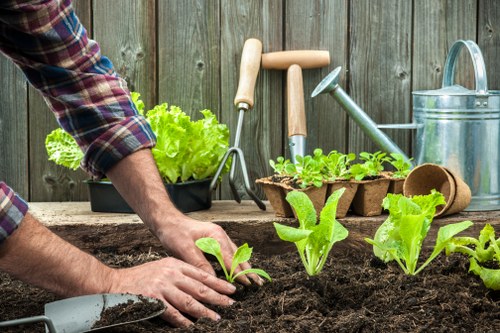
Seasonal Garden Care in Islington
Spring Maintenance Tips
Spring is a pivotal season for garden maintenance in Islington. Preparing your garden for the warmer months involves pruning, planting new blooms, and fertilizing the soil to encourage healthy growth.
Start by removing any dead or diseased branches and clear out the garden beds of winter debris. Planting perennials and annuals can add vibrant colors, while mulching helps retain soil moisture.
Additionally, regular watering during the spring months is essential to establish strong roots for your plants.
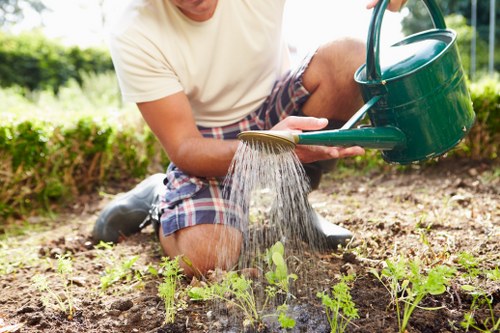
Summer Garden Maintenance
During summer, the focus shifts to managing the heat and ensuring that plants receive adequate water. Implementing a consistent watering schedule and using drip irrigation systems can help maintain soil moisture without overwatering.
Regular weeding is crucial to prevent unwanted plants from competing with your garden’s flora. Additionally, providing shade for sensitive plants can protect them from the intense summer sun.
Pruning should continue throughout the summer to maintain plant health and encourage bushier growth.
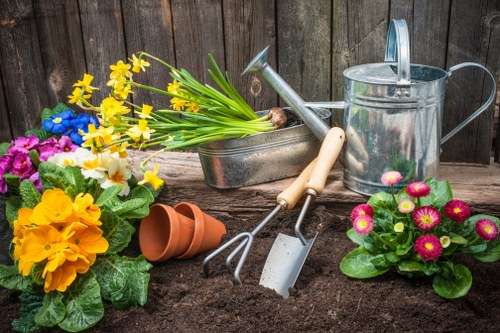
Autumn and Winter Garden Preparation
As the seasons transition to autumn and winter, it’s important to prepare your garden for the colder months. This includes cleaning up fallen leaves, protecting tender plants, and preparing your garden tools for storage.
Planting winter-hardy species and adding compost can enrich the soil, ensuring that your garden remains fertile for the next growing season.
Covering perennials and using frost cloths can safeguard plants from harsh weather conditions.
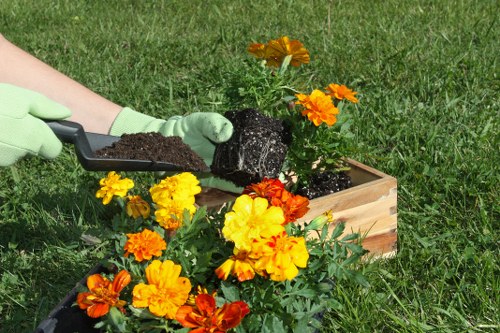
Professional Garden Maintenance Services
Benefits of Hiring Professionals
Opting for professional garden maintenance services in Islington can save you time and ensure that your garden receives expert care. Professionals have the knowledge and tools necessary to handle a variety of garden tasks efficiently.
From regular lawn mowing and hedge trimming to bespoke landscaping projects, hiring experts can transform your garden into a stunning outdoor space.
Additionally, professionals can provide valuable advice on plant selection and garden design tailored to the specific climate and conditions of Islington.
DIY Garden Maintenance Tips
Essential Tools and Equipment
For those who prefer a hands-on approach, investing in the right garden maintenance tools is essential. Basic tools include pruners, rakes, spades, and watering cans, which are fundamental for various garden tasks.
Consider ergonomic tools to reduce strain during prolonged use, and ensure that all equipment is well-maintained to extend its lifespan.
Additionally, having a reliable wheelbarrow and gardening gloves can enhance your efficiency and protect your hands from thorns and debris.
Effective Weed Control
Weeds compete with your plants for nutrients and water, making effective weed control imperative for a thriving garden. Regularly pulling weeds by hand can prevent them from spreading and taking over your beds.
Using organic mulches is another excellent method to suppress weed growth while enriching the soil. Mulching not only minimizes weeds but also helps retain moisture and regulate soil temperature.
For larger infestations, consider natural herbicides or consult a professional for safe and effective weed management strategies.
Sustainable Gardening Practices
Composting and Soil Health
Implementing sustainable practices such as composting can significantly improve your garden’s soil health. Compost enriches the soil with essential nutrients, promotes microbial activity, and enhances soil structure.
By recycling kitchen scraps and garden waste, you reduce landfill contributions and create a rich, natural fertilizer for your plants.
Maintaining healthy soil is the foundation for a robust and resilient garden, capable of withstanding pests and environmental stresses.
Water Conservation Techniques
Water conservation is vital, especially in urban areas like Islington where water resources may be limited. Implementing efficient watering systems such as drip irrigation or soaker hoses can minimize water waste and ensure that plants receive the right amount of hydration.
Planting drought-resistant species and mulching can also reduce the need for frequent watering, promoting a more sustainable garden.
Collecting rainwater through barrels and using it for garden irrigation is another effective way to conserve water and reduce your garden’s environmental footprint.
Choosing the Right Plants for Islington Gardens
Climate-Appropriate Plant Selection
Selecting plants that are well-suited to Islington’s climate is crucial for successful garden maintenance. Consider native species that are adapted to the local weather conditions, soil types, and sunlight exposure.
Native plants typically require less maintenance, are more resistant to pests and diseases, and support local wildlife, contributing to biodiversity in your garden.
Research and consult with local gardening experts to choose the best plants that will thrive in your specific garden environment.
Seasonal Flowering Plants
Incorporating a variety of seasonal flowering plants can add continuous color and interest to your garden throughout the year. Spring bulbs, summer annuals, autumn perennials, and winter evergreens each provide unique aesthetic value suited to different seasons.
Layering plants with varying bloom times ensures that your garden remains vibrant and engaging, attracting pollinators and enhancing the overall appeal.
Additionally, selecting hardy varieties can reduce the need for frequent replacements and intensive care.
Common Garden Maintenance Challenges in Islington
Dealing with Urban Wildlife
Urban gardens often attract various wildlife, some of which can pose challenges. Squirrels, rabbits, and birds may feed on your plants, causing damage and disrupting your garden’s balance.
Implementing humane deterrents such as fencing, netting, or natural repellents can help protect your plants without harming the wildlife.
Regular monitoring and swift action at the first sign of damage can prevent minor issues from escalating into significant problems.
Managing Pests and Diseases
Pests and diseases are common challenges that can compromise the health of your garden. Identifying and addressing these issues promptly is essential for maintaining plant vitality.
Using integrated pest management (IPM) strategies, which combine biological, cultural, and chemical controls, can effectively manage pest populations while minimizing environmental impact.
Encouraging beneficial insects, such as ladybugs and bees, can naturally reduce pest numbers and promote a healthy ecosystem in your garden.
Tools and Equipment for Effective Garden Care
Essential Gardening Tools
Having the right tools is fundamental to efficient garden maintenance. Essential tools for an Islington garden include:
- Pruning shears and loppers for trimming and shaping plants
- Rakes and hoes for soil preparation and weed control
- Watering cans and hoses for effective irrigation
- Shovels and spades for planting and transplanting
- Gardening gloves to protect your hands during maintenance tasks
Investing in high-quality, durable tools can enhance your gardening experience, making tasks easier and more enjoyable.
Regular maintenance and proper storage of your tools will extend their lifespan and ensure they remain effective for all your garden needs.
Advanced Gardening Equipment
For more intensive garden tasks, consider incorporating advanced equipment such as lawn mowers, hedge trimmers, and tillers. These tools can significantly reduce the time and effort required for large-scale garden maintenance.
Battery-powered or electric tools are environmentally friendly options that provide power without the noise and emissions associated with gas-powered equipment.
Assess your garden’s specific needs to determine which advanced tools will offer the most benefit and streamline your maintenance routine.
Planning Your Garden Maintenance Schedule
Creating a Maintenance Calendar
Developing a comprehensive garden maintenance schedule can help ensure that all tasks are performed in a timely and organized manner. A maintenance calendar allows you to plan seasonal activities, track progress, and allocate resources effectively.
Include tasks such as planting, pruning, fertilizing, and pest control, assigning them to appropriate times of the year based on your garden’s needs.
Using digital tools or gardening journals can aid in tracking your maintenance activities and adjusting your schedule as needed.
Prioritizing Garden Tasks
Not all garden tasks hold the same level of urgency. Prioritizing tasks based on their importance and deadlines can help manage your time and resources efficiently.
- Immediate tasks: Address urgent issues such as pest infestations or disease outbreaks promptly to prevent further damage.
- Scheduled tasks: Follow your maintenance calendar for routine activities like pruning and fertilizing.
- Long-term projects: Plan and execute larger projects, such as landscaping or installing irrigation systems, during suitable seasons.
By setting clear priorities, you can ensure that critical maintenance tasks are completed on time, maintaining the health and beauty of your garden.
Enhancing Your Garden's Appeal
Landscape Design and Layout
A well-thought-out landscape design can significantly enhance your garden's appeal. Consider the layout of your garden, including the placement of beds, pathways, and seating areas, to create a harmonious and functional space.
Incorporate elements such as focal points, focal plants, and decorative features to add visual interest and structure to your garden.
Balancing functionality with aesthetics ensures that your garden is both beautiful and practical, providing a serene environment for relaxation and enjoyment.
Incorporating Garden Features
Adding features like fountains, birdbaths, or garden sculptures can elevate the overall look and feel of your garden. These elements not only serve as attractive additions but also contribute to the garden’s ecosystem by attracting wildlife.
Lighting is another important feature that can extend the usability of your garden into the evening hours, creating a magical atmosphere.
Thoughtfully placed lighting can highlight key areas, enhance safety, and provide a warm ambiance for nighttime gatherings.
Maximizing Small Garden Spaces
Vertical Gardening Techniques
In urban areas like Islington, space can be limited. **Vertical gardening** is an excellent solution for maximizing small garden spaces, allowing you to grow more plants without taking up much ground area.
Use trellises, wall-mounted planters, and hanging baskets to cultivate a variety of plants, from herbs and vegetables to flowering vines.
Vertical gardens can also add depth and dimension to your outdoor space, making it appear larger and more lush.
Compact Plant Varieties
Choosing compact or dwarf plant varieties can help you make the most of limited space while maintaining a full and vibrant garden. These plants are bred to occupy less space, making them ideal for small gardens, balconies, and patios.
Many compact varieties offer the same beauty and functionality as their larger counterparts, ensuring that your garden remains both practical and attractive.
Incorporating a mix of compact plants can create a diverse and dynamic garden, enhancing its overall appeal.
Choosing the Right Garden Furniture
Functional and Stylish Furniture
Garden furniture not only provides comfort but also contributes to the overall look of your outdoor space. Select furniture that is both functional and stylish, complementing your garden’s design.
Materials such as metal, wood, and wicker are popular choices that offer durability and aesthetic appeal. Choose pieces that fit the scale of your garden and meet your specific needs, whether it’s for entertaining or relaxation.
Incorporating cushions and outdoor fabrics can add color and texture, enhancing the comfort and visual appeal of your garden furniture.
Maintenance of Garden Furniture
To ensure longevity and maintain the appearance of your garden furniture, regular maintenance is essential. Clean furniture regularly to remove dirt and debris, and protect it from the elements by using covers or storing it during harsh weather conditions.
For wooden furniture, consider applying protective coatings or sealants to prevent damage from moisture and sun exposure. Metal furniture should be treated to prevent rust, while wicker pieces can benefit from gentle cleaning with mild soap and water.
Proper maintenance not only preserves the functionality of your furniture but also keeps it looking attractive for years to come.
Conclusion
Effective garden maintenance in Islington requires a blend of regular care, the right tools, and thoughtful planning. Whether you choose to maintain your garden yourself or hire professional services, prioritizing the health and beauty of your outdoor space will yield rewarding results.
Contact us today to learn more about our tailored garden maintenance services and transform your Islington garden into a stunning oasis.
Book your service now and enjoy a beautifully maintained garden all year round.